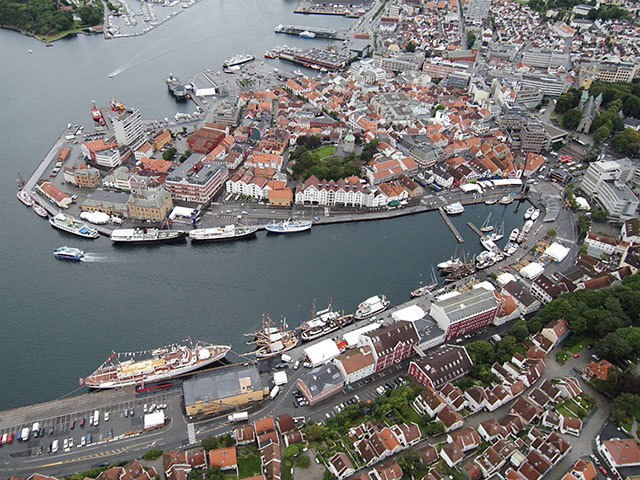
Norway, where oil helped create one of the world’s most stable and prosperous societies, finds itself among the most exposed to falling crude prices.
Though the blessings of energy wealth have hardly turned to a curse, the industry’s highest labor costs, which saw the average offshore worker earn $179,000 last year, threaten to curb investment as oil tumbles.
In August, Helge Lund, chief executive officer of state oil company Statoil ASA, remarked that while $100-a-barrel oil once provided an excuse for champagne, it now barely covered the expense of new projects.
Two months later, with crude hovering near $85 a barrel and Lund, the leading figure in Norway’s oil industry for 10 years, moving to a smaller British competitor, lower prices risk undermining economic growth and cutting tax receipts.
Norway has already been coping with 13 years of production declines from its aging North Sea fields and reduced revenues will imperil further developments to replace that oil.
Three projects led by state-owned Statoil, already having to borrow and sell assets to cover dividend payments, are at risk, said Jarand Rystad, managing partner of Oslo-based consultant Rystad Energy.
In the Arctic’s Barents Sea, the already twice-delayed, multi-billion Castberg oil project’s break-even price is between $70 and $80 a barrel, he said, putting it dangerously close to last week’s lows.
“It will depend on the brutality of the oil price fall,” he said in a phone interview. “It’s going to happen sooner or later, but it could be put on hold for a while.”
Oil’s slump has wide implications for the Scandinavian country that serves as a model of social-democratic enterprise and sober policy making. Oil and gas activity accounts for almost a quarter of the economy and fills the coffers of the world’s largest sovereign wealth fund that stands at more than $835 billion and owned about 1.3 percent of the world’s publicly traded companies.
Taxes from energy production help finance generous government spending at home and aid overseas. At 1.1 percent of national income in 2013, Norway devoted more to overseas development spending that any other industrialized country, according to the Organization of Economic Cooperation and Development.
The flip side is all that wealth has also made the nation of 5 million the planet’s most expensive place to live and do business after Switzerland, according to the World Bank.
As Norway struggles to halt the decline in oil production, the cost challenges in an offshore industry that employs the world’s best-paid workers has come into sharp relief.
Norway’s high-wage culture and a tradition of strong unions in the offshore industry meant workers earned almost twice as much as in the neighboring U.K., according to recruitment agency Hays Plc.
“Norway is probably more vulnerable to a fall in oil prices because costs are undeniably higher,” said Teodor Sveen Nilsen at Swedbank AB. “If the oil price stays at the current level for a while, we can take for granted that there will be changes in investments.”
The Norwegian oil industry’s cost challenges aren’t unique: companies like France’s Total SA and Royal Dutch Shell Plc are slashing spending after a decade of rising costs have eaten away at shareholder returns. Still, labor costs linked to offshore workers’ shift patterns of two weeks on, four weeks off make drilling a well here more expensive than anywhere else, according to a government-commissioned report in 2012.
“We’ve incurred a general cost level on the Norwegian shelf that can prove very damaging,” said Stein Lier Hansen, head of the Federation of Norwegian Industries. “We have extremely higher wages than others.”
Like its international competitors, Statoil is cutting planned spending, initiating a sweeping efficiency program designed to save $1.3 billion a year by 2016.
Statoil’s cuts have already created waves in Norway, where it operates more than 70 percent of production, causing thousands of job cuts in the service and supplies industry.
Despite that, former CEO Lund was seen as one the country’s foremost businessmen after spending a decade boosting Statoil’s international production to compensate for declining output at home.
This week, he unexpectedly quit to run BG Group Plc, where he could earn more than $20 million a year. Another outcome, perhaps, of the economic equality that underpins Norway’s social model.
“The Norwegian emphasis on a higher degree of pay equality than what we see in other societies is something that we’ll need to put weight on,” Statoil Chairman Svein Rennemo said last week, discussing the search for a successor.
Total investments in Norway’s oil industry could fall by as much as 18 percent next year from a record 227 billion kroner ($34.7 billion), according to the country’s statistics bureau.
While state-controlled Statoil sees the oil-price decline as temporary, it also believes it’s made cost cuts even more important, Arne Sigve Nylund, executive vice president for development and production in Norway, said in an interview in Bergen Oct. 16.
Spending cuts by Statoil and others have already caused delays and lower oil prices will further impact marginal projects, said Bente Nyland, the head of the Norwegian Petroleum Directorate.
That could have consequences for Norway’s future production. New discoveries in the past decade, like the North Sea’s Johan Sverdrup field, the biggest Norwegian find in decades, promise to halt the decline in crude production and even boost it until about 2025.
The question is what happens next.
A decision by Norway’s previous government to raise taxes on oil companies last year was “pretty bad” timing, Sveen Nilsen said. The tax increase, cited by Statoil as another reason for delaying Castberg, has increased political risk in a country that’s made predictability one of its most attractive trademarks, oil companies have said.
Still, Norway remains competitive in the battle for investments with an average cash cost of $43 a barrel across the whole industry, Rystad said. Total expenses in Norway are only 4 percent higher than in U.K. when the higher cost of labor is excluded, he said.
Recommended for you
